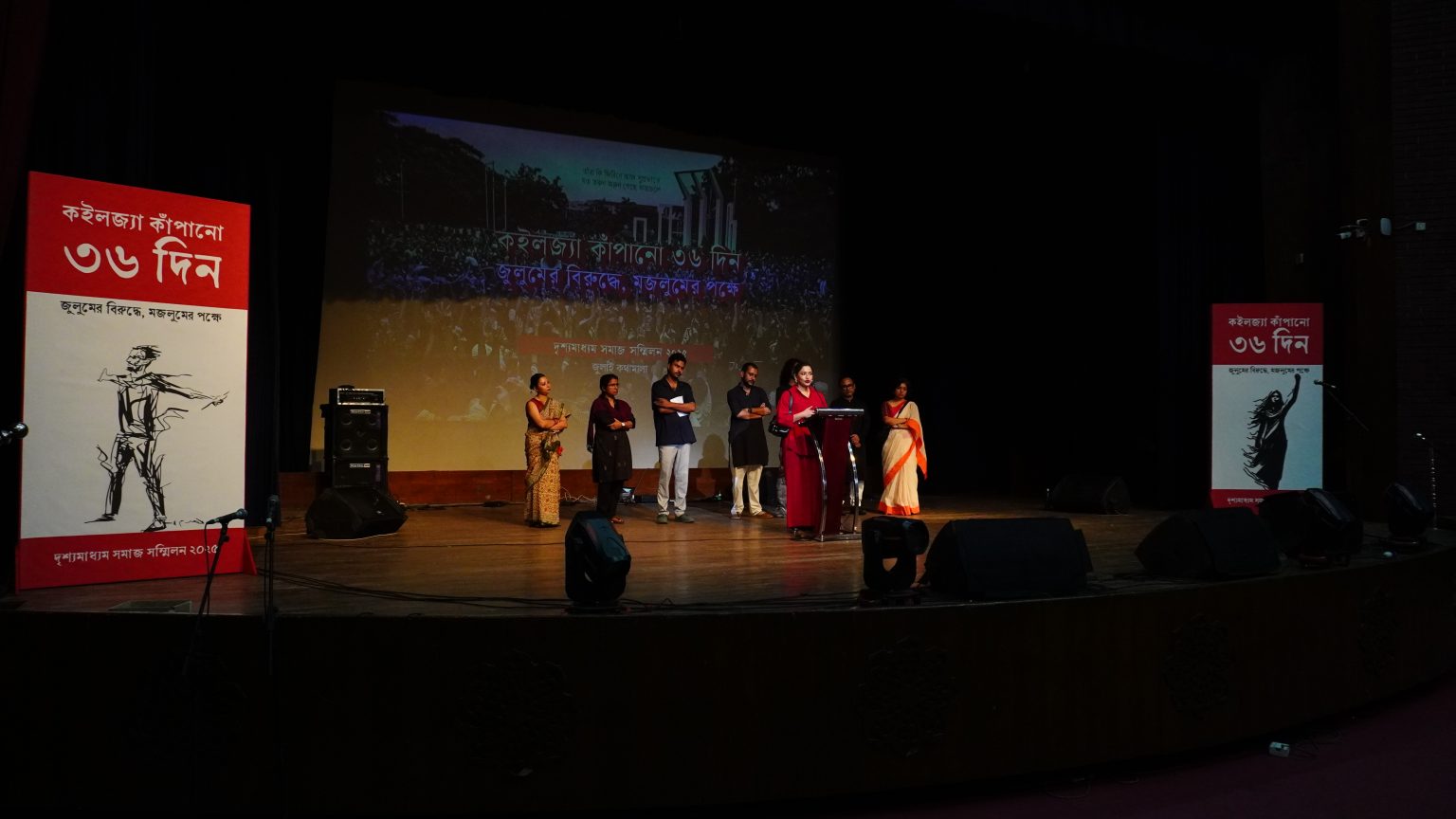By Faiyaz Chowdhury
To commemorate the first anniversary of the July Uprising, Drishsho Madhyam Shilpi Shomaj hosted a day-long event titled ‘Koilja Kapano 36 Din: Julumer Biruddhe, Mojlumer Pokkhe’ at the National Museum in Shahbagh on August 2.
Running from 11:00 am to 9:00 pm, the event featured film screenings, documentaries on the uprising, posters, paintings, panel discussions and theatrical performances.
The programme began with the national anthem and a minute of silence to honour the victims of the Milestone School fighter jet crash tragedy. Family members of those martyred in the July protests shared emotional speeches, commemorating the lives lost during the uprising.
In the afternoon, a discussion session titled ‘July Kothamala’ brought together notable figures from the worlds of art, education, cinema and literature. Attendees included filmmaker Krishnendu Chattopadhyay, actress Azmeri Haque Badhon, photographers Munem Wasif and Shahidul Alam, cultural activists Samina Lutfa Nitra and Shireen Pervin Huq, Professor Salimullah Khan, musician Hasan Aether and poet Sajjad Sharif, among others.
“If it weren’t for this group (Drishsho Madhyam Shilpi Shomaj), I wouldn’t have had the courage to go out on the streets and protest,” said Badhon. “I believed in the vision our youth had for this country — through art, culture and resistance. I still want to believe in them.”
The role of art in shaping political consciousness was a central theme of the event. “Artists cannot afford to be selfish,” said Krishnendu Chattopadhyay. “Fascism is born of extreme selfishness. It’s our responsibility to unite people through shared emotion.”
Shireen Pervin Huq reflected on a defining image of the July protests: two girls from Jahangirnagar University — one in a burka, the other in jeans — protesting side by side. “It made me confront my own biases,” she said. “But sadly, many of those girls have since been pushed into the shadows, no longer invited to the frontlines or given space on stage.”
Photographer Shahidul Alam echoed this concern. “Criticism of tyranny must come while the tyrant is still in power, not after they’ve fallen,” he said. Alam also criticised the event’s VIP seating, stating, “There should be no VIP rows at all.”
“The reason Pakistan didn’t see a proper election until 1970 was because West Pakistan feared the possibility of a Bengali rising to power,” said Professor Salimullah Khan at the event. “Back then, they would suspend the constitution to clear the path for fascism. Today, they no longer suspend it; they simply hollow it out to extend their grip on power. This is what we now call late fascism,” he explained.
He also voiced concerns about recent decisions made by the current government regarding the constitution and the structure of parliament. “To be honest, I’m deeply sceptical about the future. Reserving a third of parliamentary seats for individuals handpicked by the president doesn’t look like progress towards democracy,” he remarked.
Artist and activist Samina Lutfa shared a more personal perspective. “I’m here simply as a small artist. Many artists now feel like this isn’t the country we envisioned after the uprising,” she said. “But I don’t feel that way. I never wanted anything from the uprising. People were dying, and I just wanted to help save them.”
Poet Sajjad Sharif invoked the legacy of 1971 and linked it to the recent struggle. “In most countries, human rights come as a birthright. We had to fight for ours—in 1971, and again in 2024. If we truly believe we share the blood of our fallen brothers and sisters, we must ensure their sacrifice was not in vain.”
Drishsho Madhyam Shilpi Shomaj, a collective of artists from various disciplines, was founded on August 1, 2024, in the wake of the uprising. The organisation also used the occasion to unveil its future plans and commitments.
An anti-fascist film exhibition ran throughout the day in a separate gallery space and the event concluded with a cultural performance.


